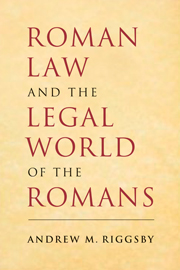Book contents
- Frontmatter
- Contents
- ROMAN LAW AND THE LEGAL WORLD OF THE ROMANS
- 1 Introduction
- 2 Roman History – The Brief Version
- 3 Sources of Roman Law
- 4 Sources for Roman Law
- 5 The Legal Professions
- 6 Legal Education
- 7 Social Control
- 8 Legal (In)equality
- 9 Writing and the Law
- 10 Status
- 11 Civil Procedure
- 12 Contracts
- 13 Ownership and Possession
- 14 Other Rights over Property
- 15 Inheritance
- 16 Women and Property
- 17 Family Law
- 18 Delict
- 19 Crimes and Punishments
- 20 Religious Law
- 21 Law in the Provinces
- 22 Conclusion
- Documents
- Glossary
- Further Reading
- Index
13 - Ownership and Possession
Published online by Cambridge University Press: 05 June 2012
- Frontmatter
- Contents
- ROMAN LAW AND THE LEGAL WORLD OF THE ROMANS
- 1 Introduction
- 2 Roman History – The Brief Version
- 3 Sources of Roman Law
- 4 Sources for Roman Law
- 5 The Legal Professions
- 6 Legal Education
- 7 Social Control
- 8 Legal (In)equality
- 9 Writing and the Law
- 10 Status
- 11 Civil Procedure
- 12 Contracts
- 13 Ownership and Possession
- 14 Other Rights over Property
- 15 Inheritance
- 16 Women and Property
- 17 Family Law
- 18 Delict
- 19 Crimes and Punishments
- 20 Religious Law
- 21 Law in the Provinces
- 22 Conclusion
- Documents
- Glossary
- Further Reading
- Index
Summary
This is a particularly technical area of the law, and the extent of my simplification will be greater than usual. “Ownership” is, in general, the right (or a set of rights) to control a thing, a piece of property. While there are differences between Roman and common law in this area, it would be fair to say that the Romans had a notion of ownership, which they called dominium. (I will also sometimes use the alternative English term “title” as a synonym.) Since ownership is a matter of rights, the question of who “owns” something is necessarily a question about legal rules. Both Roman and common law also give some recognition to the notion of “possession.” At least initially, the question of who “possesses” something is a matter of fact, not of law, but over time both systems turn possession into something that is more like a lesser degree of ownership. The kind of “things” that can be owned in Roman law are quite varied, including movable property (money, tools), real estate (both land and buildings), living beings (livestock, pets, human slaves), and more abstract rights (the right to collect a debt, to extract clay from a piece of land, to file certain kinds of lawsuit). The first two sections of this chapter will treat the basic rules of ownership and possession, respectively. The third section will then discuss how the two notions were brought closer together over time.
- Type
- Chapter
- Information
- Roman Law and the Legal World of the Romans , pp. 135 - 142Publisher: Cambridge University PressPrint publication year: 2010



